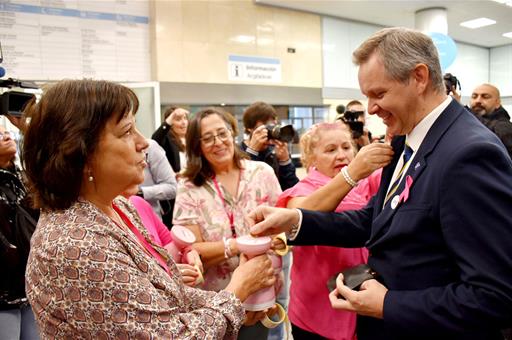Miñones highlights the strengthening of diagnostic and therapeutic capacities thanks to the Recovery Plan's NextGenerationEU funds
News - 2023.10.19
He did so during his visit this Thursday to the University Hospital of Navarre (HUN), together with the Regional Minister for Health of the Government of Navarre, Fernando Domínguez, and the acting Government Delegate in the Autonomous Community, Valentín Carrasco.
Miñones saw first-hand the new positron emission tomograph (PET), the first of its kind in the Navarre public health system, and the new SPECT gamma camera with which the Nuclear Medicine service of the hospital has been equipped, and which are part of the High Technology Investment Plan (INVEAT), included in Component 18 of the Recovery Plan.
The programme, José Miñones recalled, has a budget of nearly €800 million, which is facilitating the renovation and expansion of up to 851 high-tech pieces of equipment in the NHS, and represents the largest investment in the history of equipment for public health in our country.
In the case of Navarre, the INVEAT Plan involves an investment of more than €15.3 million for a total of 13 teams: 3 linear accelerators, 2 CT scanners, 1 MRI, 1 PET-CT and 3 SPECT-CT.
Navarre, first to set up 100% of INVEAT equipment
The acting Minister for Health publicly thanked all the autonomous communities for their involvement in this programme, highlighting the good work of the Autonomous Community of Navarre, which he congratulated for being the first to conclude the process of acquiring, installing and commissioning all the equipment charged to the INVEAT Plan. "This shows that collaboration is the key and that through dialogue, common objectives can be reached," said Miñones.
He also stressed the positive impact that the renovation process being undertaken in the NHS is having on the diagnosis and therapies of rare, chronic, neurological and oncological diseases, reducing not only the use of radiation but also assessment times, which benefits both professionals and patients.
In short, the aim is to "put high-capacity technology at the service of citizens" by improving the diagnosis and treatment of high-impact diseases.
International Breast Cancer Day
At this point, Miñones had words of support for all the people and families affected by breast cancer, coinciding with the ephemeris of the International Day for the Fight against Breast Cancer, today 19 October, and recalled the importance of continuing to focus on both the prevention of the disease and its early diagnosis.
Healthy habits, treatments and population screening are the "backbone" of the government's response to breast cancer, with science, research and care at the core, she stressed.
She also highlighted the research work on breast cancer carried out through competitive calls from the State Research Agency (AEI) and the Strategic Action in Health of the Carlos III Health Institute (ISCIII).
This response to breast cancer joins other oncological disease responses promoted by the Government of Spain, such as the Spanish NHS Cancer Strategy, the Plan for the Implementation of Protontherapy, the approval of the Right to Oncological Oblivion, the PERTE for Vanguard Health, the development of the Personalised Medicine Plan and the new calls for proposals from the CDTI and the Carlos III Health Institute with the aim of increasing the quantity and quality of basic and clinical research projects in cancer.
The ISCIII has a specific line of research on the genetic and molecular epidemiology of breast cancer, carried out within the Cancer and Environmental Epidemiology Unit. Likewise, the Biomedical Research Network Centre (CIBERONC) has a specific programme on breast cancer and the National Cancer Research Centre (CNIO) has a Breast Cancer Research Unit, as part of its Clinical Research Programme.
The acting Minister for Health was accompanied on the visit by the manager of the Navarre Health Service-Osasunbidea (SNS-O), Alfredo Martínez; the manager of the University Hospital of Navarre (HUN), Estrella Petrina; and part of the management team of the hospital's Nuclear Medicine service.
Non official translation





